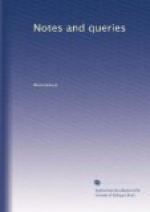HENRY FOSS.
42. Devonshire Street, 12. Jan. 1851.
[Footnote 7: Representing, as well as I remember, a perfect steam-boat.]
[Footnote 8: Meaning Russia binding.]
[We are also indebted to [Curly-pi] for a reply to NOCAB’S query.]
“The lucky have whole days” (Vol. i., pp. 231. 351.).—I can inform your correspondents P.S. and H.H., that the passage in question is correctly quoted by the latter at p. 351., and that it is to be found in Dryden’s Tyrannic Love.
HENRY H. BREEN.
St. Lucia, West Indies, Nov. 1850
“Clarum et venerabile nomen” (Vol. ii., p. 463.).—Your enquirer as to whence comes “Clarum et venerabile nomen,” &c., will find them in Lucan. Book ix. l. 203.
E.H.
Norwich.
Occult Transposition of Letters (Vol. i., p. 416.; Vol. ii., p. 77.).—Concert of Nature.—Other examples of these ambiguous verses are given by J. Baptista Porta, de Furtivis Literarum Notis, one of which has suggested the following lines, as conveying the compliments of the season to the editor of “NOTES AND QUERIES:” but which, transposed, would become an unseasonable address:—
“Principio
tibi sit facilis, nec tempore parvo
Vivere
permittat te Dea Terpsichore.
Si autem conversis dictionibus leges, dicent,—
Terpsichore Dea
te permittat vivere parvo
Tempore,
nec facilis sit tibi principio.”
I beg leave sincerely, to add, in the words of Ausonius (Ep. xxv.),—
“Quis prohibet Salve atque Vale
brevitate parata
Scribere?
Felicesque notas mandare libellis.”
This magnificent epistle inculcating—
“Nil mutum Natura dedit: non
aeris ales
Quadrupedesve silent,” &c.
should be compared with the celebrated stanza of Spenser’s Faerie Queen (book ii. canto xii. st. 71.), beginning with
“The joyous birds shrouded in cheareful shade;”
and with D’Israeli’s animated defence, in his Amenities (vol. ii. p. 395.) of these charming verses against the [Greek: plemmeles] and tasteless, the anti-poetical and technical, criticism of Twining, in his first Dissertation on Poetical and Musical Imitation.
T.J.
Darby and Joan (Vol. iii., p. 38.).—I never heard of the tradition mentioned by H. I can only suppose that the poet referred to was the first person who introduced the ballad at the manor-house. Helaugh Nichols, an excellent authority in such matters, whose trade traditions, through the Boyers, father and son, went back a century and a half, tells us that the ballad was supposed to have been written by Henry Woodfall, while an apprentice to Darby. The Darbys were printers time out of mind—one Robert Darby was probably an assistant to Wynkyn de Worde, who certainly left a legacy to a person of that name.




